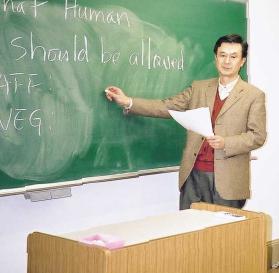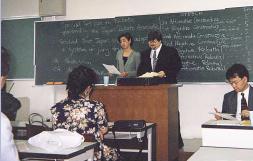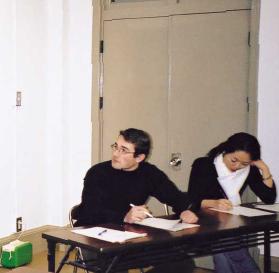ResearchThe World of
Narahiko Inoue |

|
I have been engaged in debating since I learned to debate in English in a university English Speaking Society (ESS), where students practice public speaking, group discussion, debate, and drama among other things. As an educator/ researcher, I am concerned with how communication works in debating as well as how we can improve students' skills in debating. In this essay I will first define debate from a viewpoint of the study of communication. Second, I will illustrate how students learn important communication skills in the world of debating. Third, I will show how debate will connect Japanese students to their international counterparts. Finally I will mention a bit of dream I have that Kyudai will excel in this area in the future.
Debate is a process of communication in which the two opposing parties try to defend their side of a given proposition in order to persuade a third party with rational argumentation. In its narrow sense, debate is different from group discussion as a decision- making process. In discussion, participants often consider an open-ended question like "What should we do about problem X?" and they consider multiple alternatives to seek for an agreement among them. Debate considers a yes-no question like "We should do Y to solve X" and the decision is given by the audience/judge.

|
| Cross-Examination at a Japan-U.S. Exchange Debate |
There are many kinds of debate. While real-world decisions may not be made only through pure debate, the concept of debate is often applied in different degrees in rational decisionmaking. Debate for educational and training purposes, called academic debate, is increasingly popular in Japan recently. In this kind of debate, students learn argumentation through advocating either side of a given proposition, often regardless of their personal beliefs. Debate is used in science and social studies classes as well as in Japanese and English language classes from elementary schools to colleges and universities. Debate is also used in in-service training in private companies and government organizations. One special form of academic debate is competitive debate, which is often practiced in extracurricular clubs in schools and universities.
Participants of competitive debate, especially those who compete in tournaments, form their own world where they have their own network and are bound by special customs and norms. This world may well be called a speech community in which its members share the same language and norms of interaction. This is like academic disciplines and other professional worlds that form their own communities and have their own ways of communication such as in writing and presenting research papers. For example, Japanese university students in extracurricular clubs have been practicing one of the styles of debate in English, which may be called "academic policy debate" since it often deals with a government policy and requires debaters to conduct a lot of research. They prepare manuscripts of speeches and read them in the tournament. A typical format of one debate round is as follows:
A Typical Format of Academic Debate
1st Affirmative Constructive Speech 8 min.
Cross-Examination by the Negative Team 3 min.
1st Negative Constructive Speech 8 min.
Cross-Examination by the Affirmative Team 3 min.
2nd Affirmative Constructive Speech 8 min.
Cross-Examination by the Negative Team 3 min.
2nd Negative Constructive Speech 8 min.
Cross-Examination by the Affirmative Team 3 min.
1st Negative Rebuttal Speech 4 min.
1st Affirmative Rebuttal Speech 4 min.
2nd Negative Rebuttal Speech 4 min.
2nd Affirmative Rebuttal Speech 4 min.
(10-min. flexible preparation time is allocated to each team.)
Propositions (resolutions), formal topics for debate, deal with socially important current controversies. Examples of the propositions students debated recent years are listed below. They cover such diverse areas as law, diplomacy, medicine, economics, energy, and biotechnology.

Selected Past Propositions for Policy Debate
| Resolved: | That Japan should adopt a system of jury trial in its courts of law. |
| Resolved: | That Japan should promote closer diplomatic relations with one or more of the following: Myanmar, North Korea, and Taiwan. |
| Resolved: | That the Japanese government should legalize practices of medical euthanasia or organ transplants from brain dead donors. |
| Resolved: | That Japan and/or the United States should terminate the Japan-US Security Treaty. |
| Resolved: | That Japan should abolish the death penalty. |
| Resolved: | That the Japanese government should significantly reduce the progressiveness in the rates of direct taxes imposed on individuals. |
| Resolved: | That the Japanese government should abandon all nuclear facilities used for the national energy supply. |
| Resolved: | That the Japanese government should prohibit the production, import, and sale of any and all genetically modified food. |
In this world of debating, students are not just learning English, but rather they are learning important academic and critical thinking skills which can be applied to their daily and professional communication. When the current season's resolution is announced, students start research and analysis. They begin brainstorming among themselves, finding information in libraries and through the Internet, writing up possible affirmative and negative cases. They examine the strengths and weaknesses in evidence and reasoning in their arguments. As their preparation progresses, they start practice debate rounds in their club and then with teams from other schools. With all this preparation, they will participate in intercollegiate tournaments going through regional preliminaries up to the national finals.
Although this kind of academic debate can be applied in classroom situations both in language classes and content area courses in schools and universities, extracurricular clubs can provide intensive and extensive training with peer support that enables students strive for excellence. This is just like competitive sports; you can use soccer in physical education classes but more advanced activities are only possible in soccer clubs/teams.
In this way the world of debating offers unique opportunities to students but this world is connected to the world outside. Students can debate with people from around the world. Until recently, Japanese students' opportunities had been limited to meeting with visiting American debate teams. Still it makes a highlight in a student debaters' career to cross swords with topranking American debaters. In Kyudai, I have arranged several of these sessions.
More recently, these opportunities have expanded. Japanese students have started to participate in debate tournaments in South East Asia, Australia, and even aim at the World tournament. These tournaments are conducted in a style of debate called "Parliamentary Debate," which requires more spontaneous arguments than academic policy debate. Each round uses a different topic, which is announced only 20 minutes before the round. Debaters construct their arguments more on broad knowledge about a variety of topics than on prepared briefs, which are typical of academic policy debate.
In Parliamentary Debate, Japan is a "developing" country. Teams from Japan are placed toward the lower end in Asian tournaments. Of course it is difficult for Japanese to compete with teams from English-medium universities from Philippines, Singapore, and Malaysia, but the problem is not just English. The faculty and the social support is different. Debating is seriously promoted by universities and sometimes by the government in such countries. Future leaders are trained in debating. One unfortunate aspect of this competitive debating in Japan is lack of faculty and financial support from the university. Concerned students and coaches have started non-governmental organizations to help develop students' debating. Official governmental or university aid is in need for further development.
I have mainly talked about debating in English but competitive debating is also available in Japanese. This is also a connection to the world. Debating is an excellent activity for advanced learners of Japanese just as debating for learners of English. Debating is used in advanced Japanese classes and I know of a tournament for foreigners living in Japan. I saw the Web page of a Japanese-language debating club in a Taiwanese university. Some people are dreaming of a world debate tournament in Japanese. It's not an impossible dream.
In this way, competitive debating is an important activity in which students can learn academic and critical thinking skills. Debating also has a potential of connecting students to the world but unfortunately Japan is a "developing" country. I would like to conclude this essay by calling for more support from the government and universities in promoting competitive debating. If Japan can host a world cup soccer games or robot contests, we can just as well host a world debate tournament, at least an Asian tournament. Kyudai can train their students in debating and they will bring home a world cup or an Asian cup.
| Please contact Professor Inoue for more information about debating, debating classes, and debating clubs via email (inouen@flc.kyushu-u.ac.jp) or visit his homepage (http://www.rc.kyushu-u.ac.jp/~inouen/). |